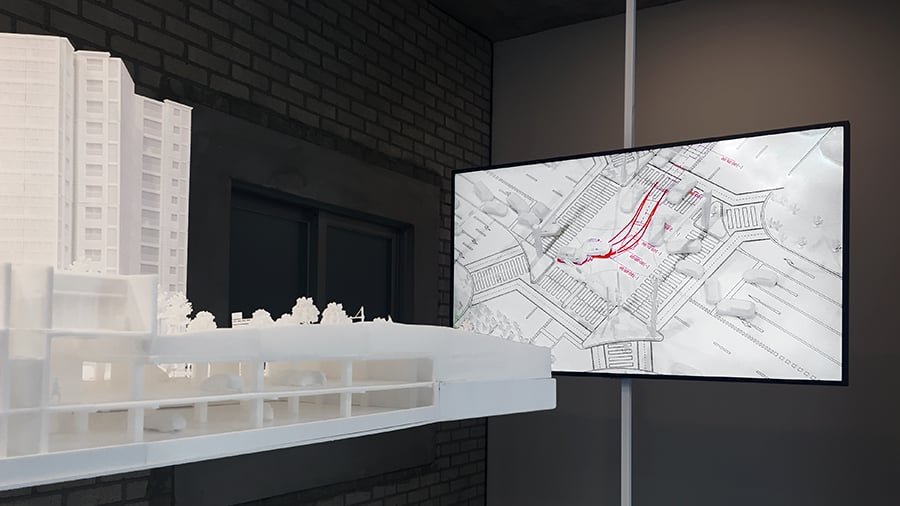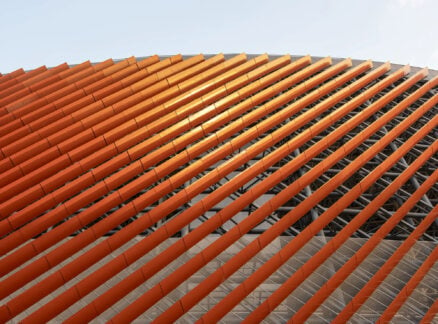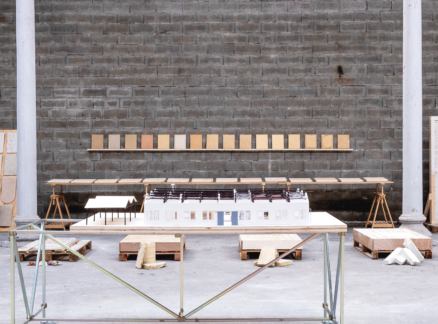
November 3, 2017
Exhibition Immerses Visitors in Korea’s Secretive Smart City
Titled “Control Syntax Songdo,” the installation is part of the 2017 Seoul Biennale for Architecture.

From “Knowledge City” to “Science City” to “Smart and Sustainable City,” the $35 billion development Songdo is a cipher for whatever the “City of the Future” represents at that moment. That’s because the mixed-use district, a Free Economic Zone home to approximately 100,00 residents (reports vary), is always selling itself: Songdo is a testing ground for high-tech urban products (from vibration sensors to advanced surveillance) developed by the likes of Cisco and u.Life Solutions. While Songdo’s extreme concentration of high-tech infrastructure is a rarity, those technologies are meant for export and may find their way to a city near you. An exhibit at the 2017 Seoul Biennale for Architecture and Urbanism, curated by Mark Wasiuta and Farzin Lotfi-Jam with Jean Im, seeks to assay the city’s sales pitch to reveal its complex reality.
Control Syntax Songdo is a sequel to a similar 2017 installation (Control Syntax Rio) by Wasiuta and Lotfi-Jam that explored Rio de Janeiro’s high-tech control center, known as the COR. That exhibit also used a room-sized cityscape model and TV monitors to immerse visitors in the COR’s automated disaster-response system. However, in addition to acting as Rio’s nerve center, the COR is also a publicity tool that seeks to project order over crime or natural disasters. The Control Syntax Rio model was a theater of sorts—a theater where the COR played out its public relations role as an efficient and heroic agent of order. Control Syntax Songdo is also a theater, but one that uses urban disasters to reveal the anxieties and tensions deeply embedded within the Korean city’s own vigilant network of sensors, cameras, and controllers.

While Songdo’s engineers and operators refused to be interviewed about the city’s proprietary technologies, Wasiuta and Lotfi-Jam learned of Songdo’s many monitoring systems: cameras look for building fires and track car license plates, recording who comes and goes. Sensors embedded within the urban fabric (in fences, buildings, streets, and elsewhere) monitor air quality, electricity usage, and physical movement, looking for anomalies and transgressions. Domestic “smart home” technologies extend from waste collection (via coded trash bags and pneumatic tubes) to interactive educational TV programming for children. For Songdo’s residents, “a sense of domestic security permeates the city and ubiquitous street monitoring is as familiar as an apartment smoke detector,” write Wasiuta and Lotfi-Jam.
Consequently, the Control Syntax Songdo model—which depicts disasters playing out on a typical Songdo intersection—illustrates the fearful consequences of when technology fails. Many “smart city” products, Lotfi-Jam tells Metropolis, typically boil down to traffic management, making compound traffic accidents the system’s greatest fear. The city is ever watchful, a fact represented by 360° videos—taken at Songdo intersections—mounted on the exhibition walls. As Wasiuta and Lotfi-Jam write in an upcoming book, Songdo is a “city as theater of control,” one “narrated and dramatized” by complex algorithms that draw from all-seeing sensors.

More broadly, the pair says that Rio and Songdo both commit a subtle sleight-of-hand: they confuse solutions to deep-rooted problems (political volatility, densifying cities, pollution, infrastructure failure) with high-tech emergency response systems (such as those preventing car accidents). Grand promises of sustainability, safety, and efficiency are ultimately employed to market lesser products, but products that nonetheless could change how we use and inhabit cities. “Global commerce and municipal government, along with repression and agency, surveillance and security, efficiency and invasiveness, are neither positions nor ideas that remain stable or distinct in Songdo or Rio,” they write. “They orbit around each other, leaving a comet trail of smart city concepts and clichés of interaction, responsiveness, and the social benefits of urban data.”
Soon, Songdo won’t be the only ex nihilo high-tech testing ground. Tech giant Alphabet’s Sidewalks Labs just announced that a similar development would be rising on the Toronto waterfront; the project has just launched a year-long community engagement process.
You may also enjoy “Sidewalk Labs Announces New Smart City District For Toronto.”
Recent Viewpoints
Viewpoints
Sustainability News Updates for Q2 2025













